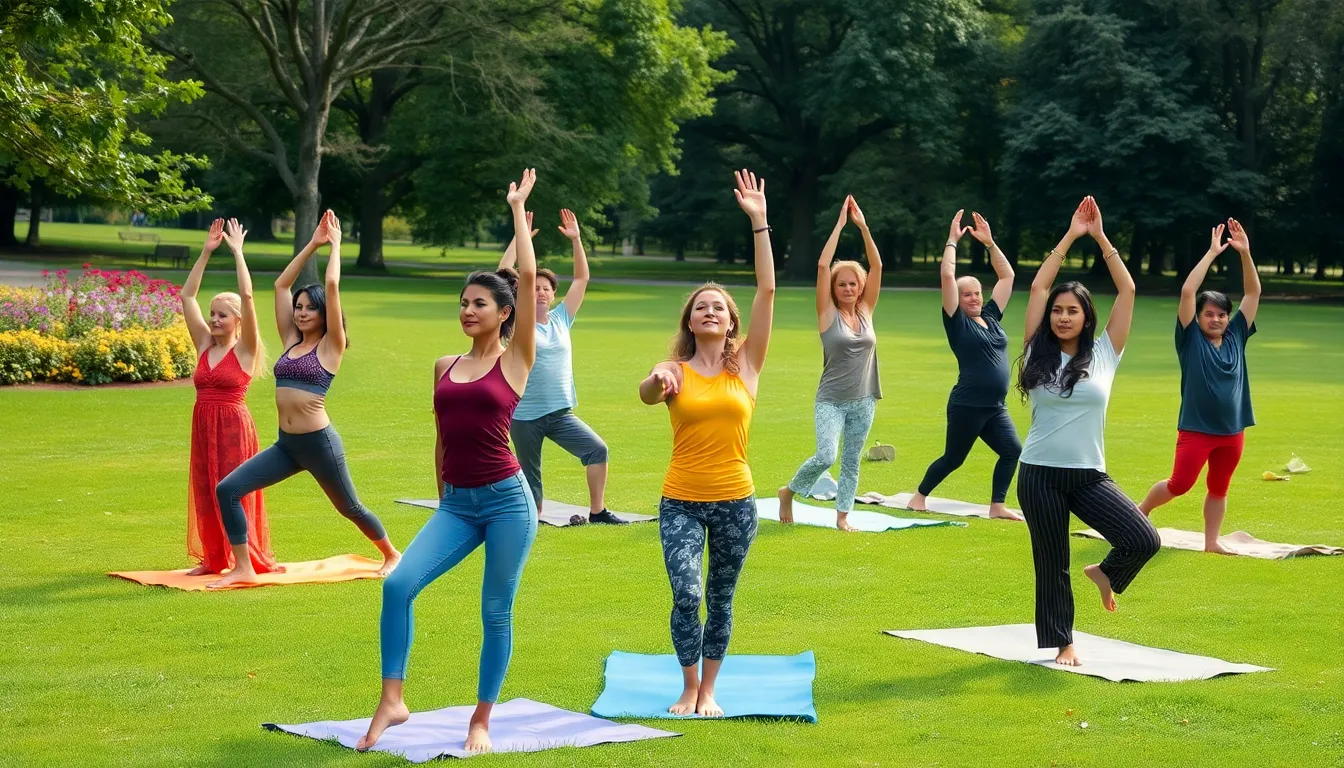Table of Contents
ToggleIn today’s fast-paced world, the concept of holistic wellness is gaining traction as individuals seek balance in their lives. This approach emphasizes the interconnectedness of mind, body, and spirit, recognizing that true health goes beyond mere absence of illness. By addressing emotional, physical, and spiritual needs, holistic wellness offers a comprehensive path to well-being.
People are increasingly turning to holistic practices to enhance their quality of life. From mindfulness and nutrition to alternative therapies, these methods empower individuals to take charge of their health. Embracing holistic wellness not only fosters personal growth but also cultivates resilience against life’s challenges. As the journey unfolds, the benefits of a balanced lifestyle become clear, inviting everyone to explore this transformative approach to health.
Understanding Holistic Wellness
Holistic wellness emphasizes the integration of mind, body, and spirit, acknowledging their interconnected roles in achieving overall health. This approach fosters a deeper understanding of individual well-being and promotes a balanced lifestyle.
Definition of Holistic Wellness
Holistic wellness refers to an inclusive approach to health that addresses physical, emotional, and spiritual well-being. It recognizes that health isn’t merely the absence of disease; it involves an individual’s overall quality of life. Holistic wellness encourages self-care practices that nurture each aspect of a person’s existence, fostering a deeper sense of fulfillment and harmony.
Key Components of Holistic Wellness
- Physical Health: Engaging in regular exercise, maintaining a balanced diet, and getting adequate sleep contribute to physical wellness.
- Emotional Health: Recognizing and managing emotions enhances emotional stability and resilience, promoting mental well-being.
- Spiritual Health: Exploring personal beliefs, practices, and values fosters spiritual growth, leading to a profound sense of purpose and connection.
- Social Health: Building supportive relationships and community connections enriches social wellness, encouraging open communication and collaboration.
- Environmental Health: Ensuring a safe and nurturing environment supports mental and physical health, highlighting the significance of surroundings.
- Intellectual Health: Engaging in lifelong learning and stimulating mental activities enhances cognitive function and creativity.
Benefits of Holistic Wellness

Holistic wellness offers numerous advantages, fostering a balanced lifestyle that nurtures every aspect of an individual’s being. By addressing physical, emotional, and spiritual dimensions, this approach promotes overall well-being.
Physical Health Advantages
- Enhanced fitness levels: Regular exercise improves cardiovascular health, strengthens muscles, and increases flexibility.
- Improved nutrition: A balanced diet rich in whole foods supports immune function, boosts energy, and aids weight management.
- Pain relief: Alternative therapies like acupuncture and massage therapy provide effective pain management without relying solely on medication.
- Better sleep quality: Stress reduction techniques, such as mindfulness and meditation, enhance sleep patterns and promote restorative rest.
- Increased vitality: Integrating holistic practices encourages positive lifestyle changes that elevate energy levels and overall health.
Mental and Emotional Benefits
- Stress reduction: Mindfulness practices lower stress hormones, promoting relaxation and mental clarity.
- Improved resilience: Coping strategies from holistic approaches equip individuals to face life’s challenges more effectively.
- Enhanced emotional regulation: Tools such as journaling and therapy foster self-awareness and emotional health, leading to better relationships.
- Greater life satisfaction: A holistic perspective promotes a sense of purpose and fulfillment, contributing to overall happiness.
- Cognitive enhancement: Engagement in lifelong learning and mental exercises boosts creativity and cognitive functioning, fostering a sharp mind.
Holistic Wellness Practices
Holistic wellness practices integrate various approaches that nurture the interconnectedness of mind, body, and spirit. These practices support overall health and encourage a balanced lifestyle.
Mindfulness and Meditation
Mindfulness and meditation promote awareness and presence in daily life. Practicing mindfulness involves focusing on the present moment without judgment, reducing stress and anxiety. Meditation enhances emotional regulation, improves concentration, and fosters inner peace. Techniques such as guided imagery and focused breathing create opportunities for self-reflection and personal growth. Regular practice can lead to a greater sense of well-being and enhanced resilience.
Nutrition and Diet
Nutrition and diet play crucial roles in holistic wellness. A balanced diet includes whole foods like fruits, vegetables, whole grains, lean proteins, and healthy fats. These nutrient-dense foods support physical health, boost energy levels, and improve mood. Incorporating mindful eating practices encourages individuals to pay attention to hunger cues and food choices, enhancing the overall relationship with food. Staying hydrated with adequate water intake is also essential for maintaining optimal health.
Physical Activity and Exercise
Physical activity and exercise contribute significantly to holistic wellness. Engaging in regular exercise improves cardiovascular health, strengthens muscles, and enhances flexibility. Activities such as yoga, tai chi, and aerobic exercises support mental well-being by releasing endorphins, which reduce stress. Setting realistic fitness goals and varying exercise routines keeps individuals motivated. Consistent physical activity promotes a healthier lifestyle and contributes to enhanced vitality and longevity.
Integrating Holistic Wellness into Daily Life
Integrating holistic wellness into daily life enhances overall well-being. Individuals can incorporate simple practices that nurture their mind, body, and spirit.
Creating a Holistic Routine
Creating a holistic routine involves daily activities that promote well-being across various dimensions.
- Morning Mindfulness: Spending five to ten minutes on mindfulness or meditation sets a positive tone for the day.
- Balanced Nutrition: Planning meals with nutrient-dense foods fosters physical health. Including fruits, vegetables, whole grains, and healthy proteins supports energy levels and mental clarity.
- Regular Exercise: Scheduling at least 30 minutes of physical activity daily—such as walking, yoga, or strength training—benefits cardiovascular health and mood.
- Social Connections: Engaging in meaningful interactions with friends and family boosts emotional health. Setting aside time to connect strengthens relationships, providing support.
- Evening Reflection: Incorporating journaling or light reading before bedtime encourages relaxation. This practice helps manage thoughts and emotions, improving sleep quality.
Overcoming Challenges in Implementation
Overcoming challenges in implementing holistic wellness practices requires intention and strategy.
- Time Management: Prioritizing wellness may prove difficult. Setting specific times for activities—like a morning mindfulness session—can help establish consistency.
- Consistency: Maintaining routine can feel challenging. Using reminders or apps can aid in staying committed to wellness activities.
- Access to Resources: Limited access to nutritious foods or fitness facilities may hinder progress. Exploring local farmer’s markets or using home workouts can provide alternative options.
- Support Systems: Lacking internal motivation can present obstacles. Joining groups or finding a wellness buddy enhances accountability and motivation toward holistic practices.
- Mindset Adjustments: Resistance to change can arise. Fostering a positive mindset toward flexibility and self-compassion supports embracing new routines.
Integrating these practices into daily life encourages a balanced lifestyle, fostering holistic wellness and improving overall quality of life.
Holistic wellness offers a transformative path toward achieving a balanced and fulfilling life. By addressing the mind, body, and spirit as interconnected elements, individuals can cultivate a deeper sense of well-being. Embracing practices like mindfulness, nutrition, and exercise empowers people to take charge of their health and happiness.
As more individuals explore these holistic approaches, they discover the profound benefits that come from nurturing every aspect of their being. The journey toward holistic wellness is not just about improving physical health; it’s about enhancing emotional resilience and fostering meaningful connections. By integrating holistic practices into daily routines, anyone can pave the way for a healthier and more vibrant life.




